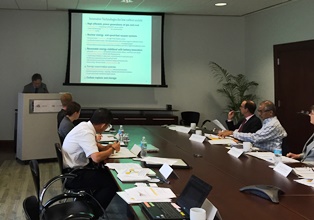Event Report Energy and the Environment
Climate Change Expert Meeting in Washington D.C. "Equitable Global Low Carbon Scenario and Approach"
July 23, 2015,
14:00
- 17:00
Venue: Washington DC, USA
The meeting opened with a welcome by Dr. Tetsuo Yuhara of CIGS, who then presented a summary of CIGS’s “Globally Sharable Energy Vision against Global Warming.” Dr. Yuhara’s comments were followed by a more detailed presentation from Dr. Fengjun Duan on CIGS’s proposal for climate change and mitigation, “Equitable Global Low Carbon Scenario and Approach.” The presentations were followed by a lively discussion and two short presentations from WRI and UCS entitled with “Seizing the Global Opportunity” and “U.S. Low Carbon Path to 2050” respectively.
A few major comments to the CIGS’s proposal emerged in the discussion, including:
- The participants from the Washington institutions were very complimentary of CIGS’s proposal of an equitable approach to an emissions pathway for a long-term reduction in global GHG emissions. They noted that the CIGS model has produced useful, interesting, and at times surprising results, while offering suggestions to improve or update the model projection such as:
・To address adaptation as well as mitigation in the model
・To consider policy/political issues, especially in terms of potential roadblocks to increased use of nuclear energy and the importance of incentives for increased use of renewable energy sources
・To consider sub‐national (state, local, etc.) and regional efforts to address climate change
・To account for recent gains in reducing the cost of renewable energy, addressing climate change, and developing shale resources
- The model of international cooperation on advanced energy technology offers an interesting cost‐minimized approach to a long‐term reduction in global carbon emissions. The participants supported CIGS’s proposal for trilateral cooperation between the U.S., China, and Japan, but also raised a few concerns including intellectual property rights (IPR) issues.
Several common understandings were obtained through the discussion,
- The carbon budget serves as the basis of mitigation rather than a determined pathway
- An equitable approach is advisable for global action against climate change
- Technological innovation will play an essential role
- Nuclear power is necessary for low carbon electricity, but feasibility of ambitious projection should be examined carefully
- Natural gas will likely be the driving force behind emissions reduction plans for at least the next decade or so. This could have a positive impact on reducing carbon emissions over the near term but a negative impact over the longer term, as it might delay a shift toward renewable.
- China’s role in combating climate change elicited significant attention from workshop participants. China’s developing climate regulatory infrastructure and international cooperation scheme involving China will generate a significant influence to the implementation of measures aimed at combating climate change.
- The CIGS hosted discussion was “very interesting” and “engaging,” and helpful to form the common scientific vision for a low carbon future.
A few major comments to the CIGS’s proposal emerged in the discussion, including:
- The participants from the Washington institutions were very complimentary of CIGS’s proposal of an equitable approach to an emissions pathway for a long-term reduction in global GHG emissions. They noted that the CIGS model has produced useful, interesting, and at times surprising results, while offering suggestions to improve or update the model projection such as:
・To address adaptation as well as mitigation in the model
・To consider policy/political issues, especially in terms of potential roadblocks to increased use of nuclear energy and the importance of incentives for increased use of renewable energy sources
・To consider sub‐national (state, local, etc.) and regional efforts to address climate change
・To account for recent gains in reducing the cost of renewable energy, addressing climate change, and developing shale resources
- The model of international cooperation on advanced energy technology offers an interesting cost‐minimized approach to a long‐term reduction in global carbon emissions. The participants supported CIGS’s proposal for trilateral cooperation between the U.S., China, and Japan, but also raised a few concerns including intellectual property rights (IPR) issues.
Several common understandings were obtained through the discussion,
- The carbon budget serves as the basis of mitigation rather than a determined pathway
- An equitable approach is advisable for global action against climate change
- Technological innovation will play an essential role
- Nuclear power is necessary for low carbon electricity, but feasibility of ambitious projection should be examined carefully
- Natural gas will likely be the driving force behind emissions reduction plans for at least the next decade or so. This could have a positive impact on reducing carbon emissions over the near term but a negative impact over the longer term, as it might delay a shift toward renewable.
- China’s role in combating climate change elicited significant attention from workshop participants. China’s developing climate regulatory infrastructure and international cooperation scheme involving China will generate a significant influence to the implementation of measures aimed at combating climate change.
- The CIGS hosted discussion was “very interesting” and “engaging,” and helpful to form the common scientific vision for a low carbon future.
Presentations
Tetsuo Yuhara
Research Director, Canon Institute for Global Studies
「Globally Sharable Energy Vision against Global Warming (Summary)」
Presentation(PDF:324KB)
Fengjun Duan
Senior Research Fellow, Canon Institute for Global Studies
「Equitable Global Low Carbon Scenario and Approach」
Presentation(PDF:1.6MB)

